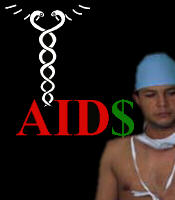By John S. James
AIDS Treatment News
 The AIDS Drug Assistance Program (ADAP) is running out of money in
increasing numbers of states; already hundreds of people who
cannot pay for drugs through insurance or out of pocket are not
getting the medicines they need.
The AIDS Drug Assistance Program (ADAP) is running out of money in
increasing numbers of states; already hundreds of people who
cannot pay for drugs through insurance or out of pocket are not
getting the medicines they need.
The ADAP Working Group is an
industry-activist coalition to seek funding for this program,
which is administered separately by each state. On September 20
the Glaxo Wellcome representative to the ADAP Working Group
circulated the following talking points -- facts about ADAP as of
September 2001 -- to use for supporting this program, in Congress
or elsewhere:
The AIDS Drug Assistance Programs (ADAPs), funded primarily
under Title II of the Ryan White Care Act, are in trouble across
the nation.
ADAP programs around the country provide needed medications to
treat HIV disease to low-income and underinsured individuals
living with HIV/AIDS.
Last year, a $130 million increase was requested to fund ADAP
programs in fiscal year 2001. Congress appropriated only $61
million for a total funding level of $589 million in federal
funding for fiscal year 2001, approximately $87 million less than
needed.
|
We are now seeing the impact of this shortage on states,
particularly in the South. Nine state ADAPs have already closed
[to new patients] including: Alabama, Arkansas, Georgia, Indiana,
Kentucky, Maine, Montana, and South Dakota.
Prior to the end of this fiscal year, 7 more states may cap
enrollment or institute other program restrictions including:
Idaho, Florida, Missouri, Nevada, Oregon, Rhode Island, and West
Virginia.
|
Related Stories from the GayToday Archive:
AIDS Drug Research Could End, Drug Companies Warn
TV Ads that Attack AIDS Funding
AIDS Drug Assistance Funding
Related Sites:
AIDS Treatment News
AIDS Drug Assistance Program
GayToday does not endorse related sites.
|
Currently, there are over 600 people on waiting lists. As the
funding crisis grows, this number will increase.
The number of clients served nationwide by state ADAPs has more
than doubled between 1996 and 2000, with ADAPs serving
approximately 70,000 clients a month.
Recent reports of declining death rates and decreasing HIV-
related morbidity point directly to the importance and cost
savings of access to antiretroviral treatment and treatment
advances using combination therapies.
In all parts of the United States, new HIV infections are
disproportionately affecting communities of color, rural
populations, inner city communities and women of color.
The ADAP program is effective and accessible, providing the gift
of life to people across the country. The very success of HIV
disease treatments continues to increase the need for ADAP.
There have been several congressional delegation letters
expressing the need for fiscal year 2002 increased appropriations
of $120 million for ADAP. We urge your careful consideration of
those requests.
We join with our colleagues in speaking for patients across the
country that this increase would ensure that those enrolled in
ADAP treatment programs will not be cut off from these essential
treatments and necessary therapies will be available for those
identified by nationwide HIV outreach programs this year.
For additional information, see the ADAP Working Group site, http://www.aidsinfonyc.org/awg/
AIDS Treatment
News
Published twice monthly
Subscription and Editorial Office:
1233 Locust St., 5th
floor
Philadelphia, PA 19107
800/TREAT-1-2 toll-free
email:
aidsnews@critpath.org
useful
links: http://www.aidsnews.org/
Editor and Publisher: John S. James
Associate
Editor: Tadd T. Tobias
Statement of Purpose:
AIDS Treatment News reports on experimental and
standard treatments, especially those available now. We interview
physicians, scientists, other health professionals, and persons with AIDS
or HIV; we also collect information from meetings and conferences, medical
journals, and computer databases. Long-term survivors have usually tried
many different treatments, and found combinations that work for them.
AIDS Treatment News does not recommend particular therapies,
but seeks to increase the options available.
AIDS Treatment News is published 24 times per year,
on the first and third Friday of every month, and print copies are sent by
first class mail. Email is available (see below). Back issues are
available at http://www.aidsnews.org/
To subscribe, you can call 800-TREAT-1-2 or 415-255-0588:
Businesses, Institutions, Professionals: $325/year. Early email
available (see below).
Nonprofit organizations: $150/year.
Individuals: $140/year, or $80 for six months. If you cannot afford a
subscription, please write or call about our sliding scale.
Outside North, Central, or South America, add airmail postage:
$20/year, $10 for six months.
Bulk rates and multiple discount subscriptions are available; contact
our office for details.
Payment can be by check, VISA, Mastercard, American Express, bank
draft, purchase order, international postal money order, or travelers
checks.
Early email: Business, nonprofit and full-rate individual
subscribers can receive an early copy by email, before the issue is
printed--in addition to their regular copy, at no extra charge. It's OK to
direct the email copy to someone else. Call our office to add email to
your subscription.
Free email: Free delivery for individuals (delayed one
week). To subscribe, send a blank email to: aidsnews-subscribe@egroups.com
ISSN # 1052-4207
Copyright 2001 by John S. James.
|


 The AIDS Drug Assistance Program (ADAP) is running out of money in
increasing numbers of states; already hundreds of people who
cannot pay for drugs through insurance or out of pocket are not
getting the medicines they need.
The AIDS Drug Assistance Program (ADAP) is running out of money in
increasing numbers of states; already hundreds of people who
cannot pay for drugs through insurance or out of pocket are not
getting the medicines they need.
